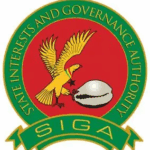General
SOEs record revenue growth but mounting losses threaten fiscal stability
Ghana’s State-Owned Enterprises achieved strong revenue growth in 2024 but continue to weigh heavily on public finances due to ballooning losses and unsustainable debt levels. According to the latest State Ownership Report released by the State Interests and Governance Authority . The report, l...
MyJoyOnline
published: Aug 31, 2025


Ghana’s State-Owned Enterprises (SOEs) achieved strong revenue growth in 2024 but continue to weigh heavily on public finances due to ballooning losses and unsustainable debt levels.
According to the latest State Ownership Report (SOR) released by the State Interests and Governance Authority (SIGA).
The report, launched in Accra on Friday, 29th August 2025, revealed that SOE revenues surged by 28.3 per cent to GHS133.68 billion in 2024, up from GH¢104.19 billion the previous year.
The energy and financial services sectors were the main drivers of this growth, recording expansions of 38.98 per cent and 49.52 per cent respectively.
Operational performance also improved, with profit before interest and tax rebounding to GH¢1.57 billion after years of heavy losses.
However, these gains were wiped out by steep finance costs, leaving the sector with a deepened net loss of GH¢9.67 billion, compared with GH¢7.14 billion in 2023.
The Electricity Company of Ghana (ECG) alone accounted for GH¢71 billion of the sector’s liabilities, while perennial loss-makers such as Tema Oil Refinery, Ghana Water Company, and the Ghana Cylinder Manufacturing Company continued to pose major fiscal risks.
Despite these setbacks, nine entities, including the Ghana Ports and Harbours Authority, Bui Power Authority, and Ghana National Gas Company, remained consistently profitable between 2020 and 2024.
The JVC sector showed a brighter picture, bouncing back from a GH¢1.33 billion loss in 2023 to post net profits of GH¢1.51 billion in 2024.
Minority-interest JVCs also delivered impressive results, generating GHS24.88 billion in profits and contributing GH¢1.03 billion in dividends to government—91 per cent of all dividend receipts.
Other State Entities (OSEs) narrowed their net deficit by nearly 69 per cent, but the Bank of Ghana’s negative equity of GH¢58.62 billion dragged the sector into a combined negative accumulated fund position of GH¢12.54 billion.
The report warned that excessive borrowing, mounting contingent liabilities, and climate risks could further destabilise the sector unless urgent reforms are implemented.
It also flagged weak adherence to climate-smart reporting, with only 27 SOEs filing climate-related initiatives in 2024, down from 33 the year before.
Finance Minister Cassiel Ato Forson admitted that the “dismal” performance of many entities undermines the government’s fiscal reset agenda.
He called for tougher enforcement of reporting deadlines and prioritisation of dividend payments as a marker of financial health.
With total public debt rising to GH¢726.70 billion—61.8 per cent of GDP—SIGA emphasised that sustained restructuring, stronger corporate governance, and enhanced revenue mobilisation will be crucial if state entities are to stop being a drag on the national purse and become true drivers of growth.
Read More